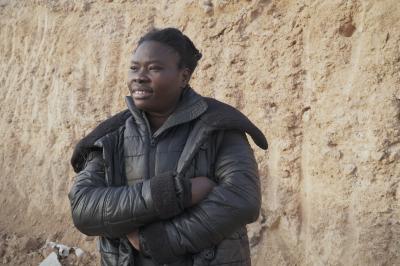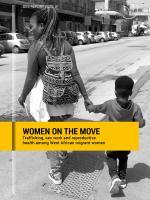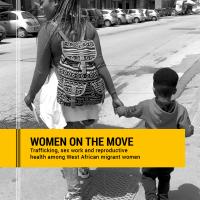EU policies and debt keep migrant women trapped in Tunisia

As it has become both harder and more dangerous to both enter and leave Libya with increased pushbacks from the Libyan Coast Guard and great risk of ending up in detention centers where torture and abuse is systematic, more migrants from West Africa are now finding themselves in Tunisia.
Recently, the EU has launched a maritime border control cooperation with Tunisia to help reduce the number of migrants leaving from Tunisia’s coast to the EU. The Tunisian coastguard has – like the Libyan coastguard - been trained and equipped by the EU to conduct so-called interceptions or pushbacks, where they "capture" migrants who are on their way across the Mediterranean to Europe and return them to the North African shores.
At the same time, with support from the EU, the borders around Tunisia have been strengthened, resulting in Tunisia gradually becoming hermetically sealed and both harder and more dangerous to enter and to leave again.
So how do you navigate and negotiate everyday life as an undocumented migrant woman from West Africa in a country like Tunisia? A country that does not have any migration or asylum policy, which is economically and politically on the verge of collapse, and which hands out daily fines if you stay in the country for more than three months without a work and residence permit?
PhD fellow Ahlam Chemlali has investigated these questions in an in-depth fieldwork, where she has interviewed more than 100 migrants, representatives of local authorities, NGOs and UN agencies, coastguards and EU diplomats working with migration and border management in Tunisia. Her research explores the unintended consequences of EU’s migration policies, with particular focus on migrant women who are stuck on the move in Tunisia, a so-called new space of transit.
"Many of the women feel like they live in an 'open air prison'. They can’t regularize their status, and thus they can’t get a work permit. There is no legal framework that can help them, and many end up owing so much money to the state that they can’t travel home again either. They are trapped.” explains Ahlam Chemlali.
Slave-like conditions as house maids
Most of the migrants she has interviewed come from the Ivory Coast, which has an agreement with Tunisia about visa-free entry. This means that if you’re from the Ivory Coast you can stay legally in Tunisia for three months.
However, if you have not been granted a residence and work permit after three months, you must return home immediately, otherwise the daily fines will start. Over time for many migrants the fines result in a large debt to the Tunisian state. And this dept must be repaid before they can legally leave Tunisia again.
"Many of the women I have talked to were not aware of this debt system. They have often arranged the trip through intermediaries who have provided them with "work" upon arrival. They often end up working as house maids, but when they have worked for two or three months and ask for their salary, they are told that the family has already paid the middleman and that they will not receive any salary. They end up in forced labor, and at the same time the fines begin, and their debt grows.”
Some of the women she has interviewed have ended up staying in Tunisia for several years without obtaining a residence and work permit. They have accumulated a completely unmanageable debt to the Tunisian state.
"This means that they can actually not afford to go home again. And the trip across the Mediterranean to Europe ends up costing less than their debt. In this way, debt to the Tunisian state can push people to risk their lives in the Mediterranean.”
One of the women Ahlam Chemlali has interviewed is 32-year-old Fatima from the Ivory Coast.
She says this about her considerations:
‘Look instead of me saving up to pay la pénalité, of TND 3,000, and then on top pay a plane ticket home for TND 1,500-2,000, I can just pay for a Zodiac (boat) to take me to Europe. It’s cheaper. I know it is dangerous, but life here is no life’ (Fatima, 32 years old, Ivory Coast).
Underground systems with childcare and alternative medicine
Ahlam Chemlali's research shows that the life of the undocumented migrant women in Tunisia is a life in a shadow community and shadow economy with limited access to health care, legal assistance to escape forced labor and without the possibility of childcare.
The women are often sole caregivers and live together in small apartments, where they can take turns to look after each other's children while they work in shifts. If they need medical care, they consult some of the elder women, who can make various herbal mixtures as a kind of alternative medicine.
“Many of the women I interviewed had had abortions using these alternative methods. Although it is possible to get an abortion in Tunisia, it is expensive and if they consult a real doctor, they fear the risk of being arrested with demands to pay the debt too,” says Ahlam Chemlali.
Most of the women have traveled from their home country to earn money to support their children at home in Ivory Coast or Cameroon. But if they end up doing forced laborer for wealthy Tunisian families it is difficult to earn money to send home.
"I spoke to a woman who had been in Tunisia for seven years. She had three children that she had to provide for in her home country. For the first six months, she had worked for a family that didn’t pay a salary. Fortunately, she had managed to find a good family afterwards, which provided a salary that she could send home to her children. But imagine being a mother that way, across borders. Having to live thousands of miles away from your children for seven years to be able to provide for them,” says Ahlam Chemlali.
Sex slaves in Libya
The majority of the women Ahlam Chemlali met in Tunisia's capital Tunis had arrived by plane from the Ivory Coast. They had not been sexually assaulted or raped on the route, and they had not sold sex.
The opposite was the case for the migrant women she met in southern Tunisia, in Medenine and Zarzis. They often came from Nigeria or Guinea and had been in Libya prior to arriving in Tunisia, often not by choice.
"They had crossed the Sahara and many borders to get to Libya. Many of them had planned to cross the Mediterranean from Libya but ended up in connection houses, where torture, abuse and rape were systematic. When they entered Tunisia, it was typically because they had managed to escape through the desert between the Libyan and Tunisian border. Others had left Libya by boat and then been intercepted by the Tunisian Coastguard, which brought them to Tunisia. Many of them were either pregnant or had very small children as a result of the sexual abuse in Libya. They had experienced atrocities in the Libyan detention centers, and now they were stuck again, in Tunisia.” says Ahlam Chemlali.
Ahlam Chemlali’s research highlights the unintended consequences of EU’s migration policies, with particular focus on migrant women who are stuck on the move in transit in Tunisia.
Parts of her research have been published in the report ‘Women on the move – Trafficking, sex work and reproductive health among West African migrant women’.



